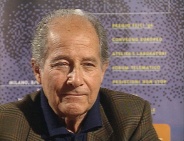 |
 |
Interview
BiographyGillo Pontecorvo was born in Pisa in 1919. After graduating in chemistry, he worked as a journalist. As a correspondent in Paris he immediately became involved in the cinema in Paris as assistant to Yves Allégret and Joris Ivens. Returning to Italy, he made a number of documentaries, including "Pane e zolfo"). He then made "Giovanna", an episode of a film with several directors "La rosa dei venti" (1956). His first full-length film was "La grande strada azzurra" (1957), which won a prize at the Karlovy Vary Festival, and in which his vigorous, romantic style was already evident. In 1959 he directed Kapň, a drama set in a Nazi death camp. His masterpiece is "La battaglia di Algeri" (The Battle of Algiers) which won the Leone d'Oro at Venice in 1966 and Nastro d'Argento 1967 a "political" film characterised by its strong emotional content, its technical skill and strong sense of ensemble. This was followed in 1969 by "Queimada" with Marlon Brando, which describes the horrors of colonialism and the revolt of the oppressed. "Ogro" in 1979 dealt with the theme of terrorism in the decline of Franco's regime. In 1992 he returned to one of his favourite themes with "Ritorno ad Algeri" (Return to Algiers), a documentary for the Italian public broadcaster RAI, which revisited the city at a very different time in its political history. In 1992 he was asked by the Board of Directors of the Venice Biennale to direct the 49th International Film Festival. |
|||
| In 1993 he directed the 50th Festival, characterised by the International Authors
Assembly and the founding of the World Union of Authors and the Permanent Secretariat of
Authors , as the first step towards making Venice the world capital of cinema authors. He
also directed the 1994 and 1995 International Venice Film Festivals. Source: La Biennale Cinema, Venice |
 |
